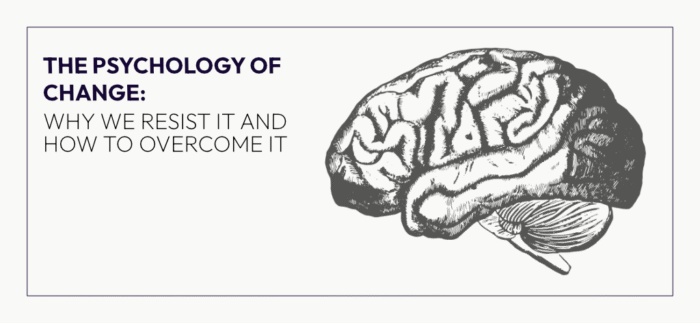Heraclitus’ ancient wisdom stated that ‘Nothing is permanent except change’. Yet, despite its necessity and benefits, many individuals and organisations struggle to embrace it. The resistance to change is deeply rooted in human psychology, driven by factors such as fear, uncertainty, and loss of control. Understanding the psychology of change and employing effective strategies to overcome psychological barriers is crucial for successful change management.
Why Do We Resist Change?
- Fear of the Unknown
One of the most common reasons for resisting change is the fear of uncertainty. People naturally seek stability and predictability, and change disrupts this comfort zone. The brain is wired to perceive uncertainty as a threat, triggering anxiety and reluctance.
- Loss of Control
Change often implies a shift in power dynamics, processes, or responsibilities. When people feel they have no say in the change, they resist it as a way to maintain control over their environment.
- Habit and Comfort Zone
Humans are creatures of habit. When a routine is established, it requires less cognitive effort to function. Any disruption to familiar processes forces the brain to work harder, leading to resistance.
- Fear of Failure
New changes often require learning new skills or adapting to new systems. The fear of not being able to cope with these changes can create resistance, especially if individuals doubt their ability to succeed.
- Social Influence and Group Dynamics
If peers or colleagues resist change, individuals are likely to do the same. The desire to fit in and avoid conflict can make people hesitant to embrace change, even when they see potential benefits.
How to Overcome Resistance to Change
- Acknowledge the Fear
Admitting that change is scary can be empowering. Recognise your resistance as a natural response, not a weakness. This awareness is the first step toward managing your emotions.
- Focus on What You Can Control
Instead of obsessing over what’s changing, identify what remains within your power. Can you control your attitude? Your response? Your preparation? Focusing on these can restore a sense of agency.
- Break It into Small Steps
Big changes feel overwhelming. Try breaking them down into manageable chunks. Small wins build momentum and reduce fear.
- Practice Self-Compassion
Change is hard. Be kind to yourself when things don’t go smoothly. Growth often involves discomfort, mistakes, and setbacks. That doesn’t mean you’re failing, it means you’re human.
- View Change as an Opportunity
Instead of seeing change as a threat and potential conflict, try viewing it as an opportunity. What can you learn? How might you grow? A positive perspective can make the journey feel purposeful rather than painful.
Final Thoughts
Resistance to change is a natural psychological response, but it is not unbeatable. By understanding the psychology of change and applying thoughtful strategies, individuals and organisations can navigate change more effectively. Change Management is not just about implementing new systems or processes; it’s about addressing the human emotions that come with it. When approached with empathy, communication, and collaboration, change becomes an opportunity for growth rather than a source of fear.
To see how we can help your organisation adapt, overcome and succeed during change, book a free 30-minute consultation today or join our community based platform!





